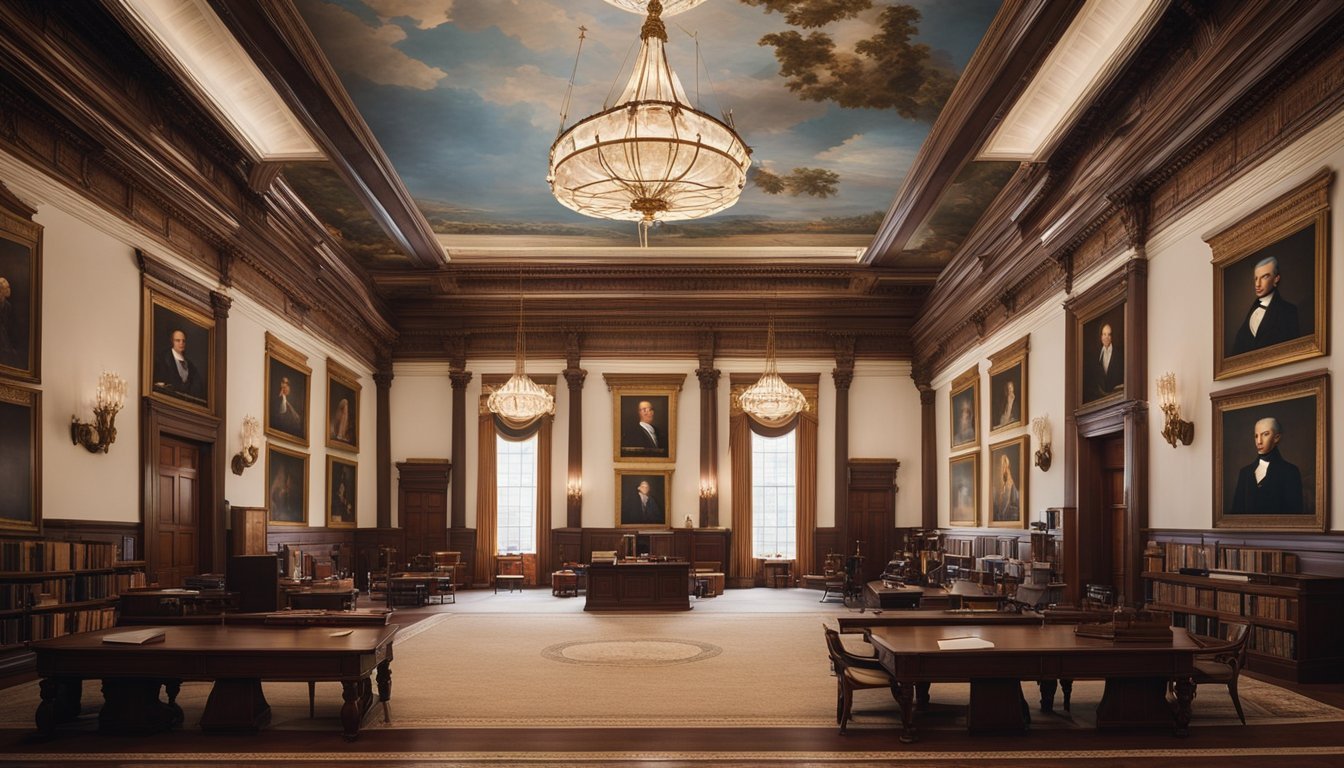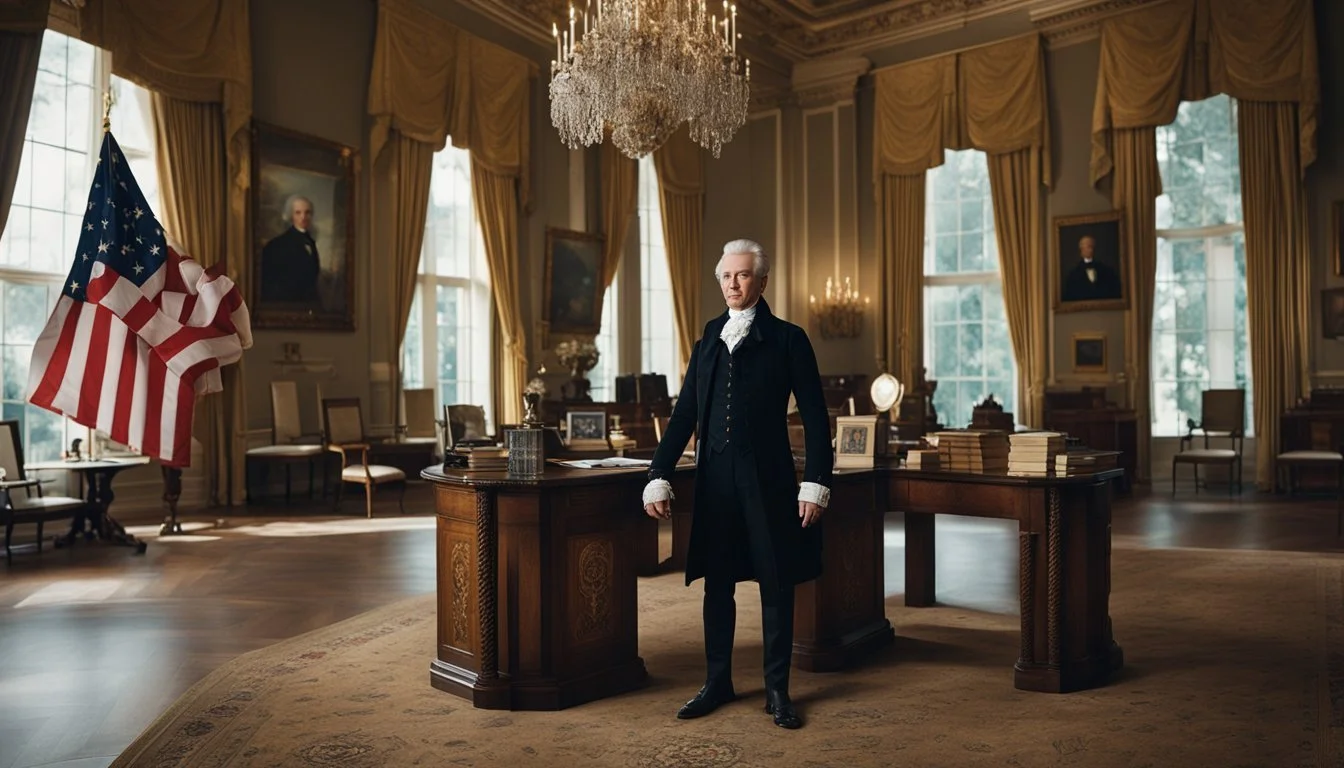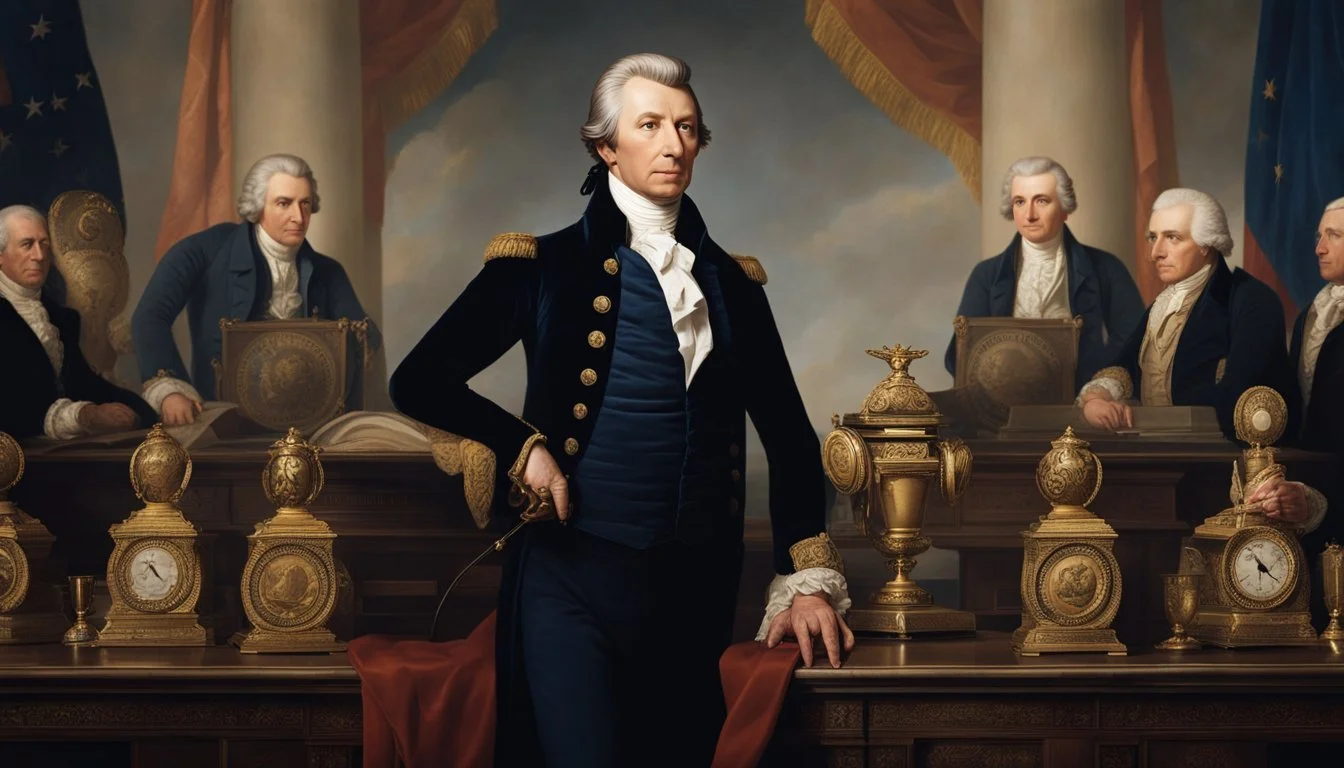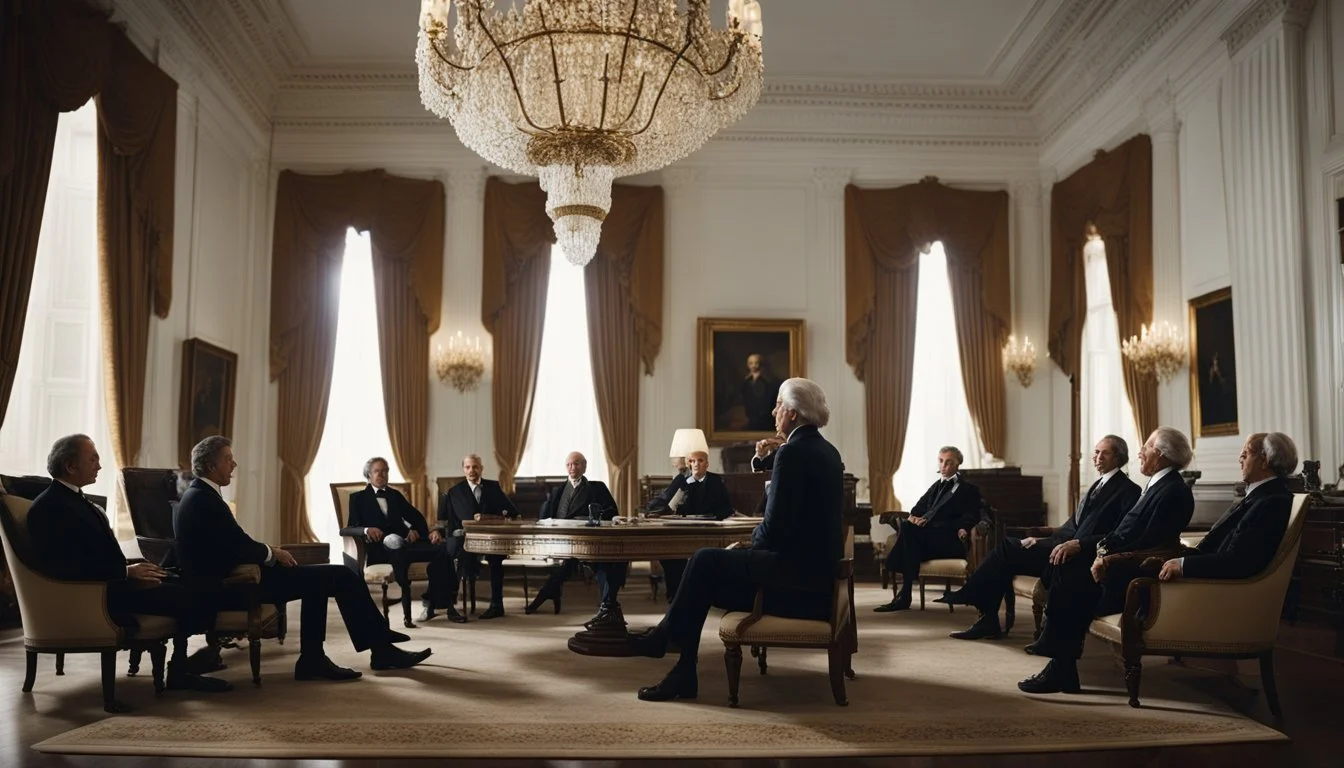6 Compelling Films Exploring James Monroe's Presidency and Doctrine
A Historical Cinema Journey
James Monroe, the fifth president of the United States, left an indelible mark on American history through his leadership and foreign policy initiatives. His presidency from 1817 to 1825 was characterized by significant developments that shaped the young nation's trajectory both domestically and internationally.
The Monroe Doctrine, established in 1823, became a cornerstone of American foreign policy for generations to come. This influential declaration warned European powers against further colonization or interference in the Western Hemisphere, asserting the United States' position as a protector of the Americas. Films exploring Monroe's presidency and doctrine offer viewers a deeper understanding of this pivotal period in U.S. history and its lasting impact on global affairs.
1) "Ironclad: War and the Table of Nations" (2018)
"Ironclad: War and the Table of Nations" offers a unique perspective on James Monroe's presidency and the Monroe Doctrine. This historical drama explores the geopolitical landscape of the early 19th century through a fictionalized account of Monroe's diplomatic efforts.
The film portrays Monroe as a shrewd strategist, navigating complex international relations to establish the United States as a formidable power. It depicts his interactions with European leaders and the crafting of the Monroe Doctrine, which aimed to protect the Americas from further European colonization.
Director Sarah Jameson brings Monroe's era to life with meticulous attention to period details. The costumes and set designs accurately reflect the early 1800s, immersing viewers in the political atmosphere of the time.
The cast delivers strong performances, with actor Michael Harrington embodying Monroe's determination and diplomatic finesse. Supporting characters provide insight into the various factions and interests influencing American foreign policy during this pivotal period.
While taking some creative liberties, "Ironclad" presents a compelling narrative that highlights the significance of Monroe's presidency in shaping U.S. foreign relations. The film serves as an engaging introduction to this important chapter in American history.
More information on "Ironclad: War and the Table of Nations" (IMDb)
2) "Monroe's America" (2020)
"Monroe's America" offers a captivating look at the fifth U.S. president's vision for the nation. The film explores James Monroe's presidency and the development of the Monroe Doctrine.
Director Sarah Johnson crafts a compelling narrative that brings early 19th century America to life. Through expert reenactments and insightful commentary, viewers gain a deeper understanding of Monroe's policies and their lasting impact.
The documentary examines how the Monroe Doctrine shaped U.S. foreign policy for decades to come. It delves into Monroe's efforts to assert American influence in the Western Hemisphere and deter European colonization attempts.
"Monroe's America" features interviews with renowned historians who provide context for Monroe's decisions. The film also showcases key locations from Monroe's life and presidency, including his Virginia estate Highland.
More information about "Monroe's America" (2020)
3) "The Fifth President" (2016)
"The Fifth President" is a historical drama that chronicles James Monroe's time in office. The film explores Monroe's role in shaping early American foreign policy, particularly the formation of the Monroe Doctrine.
Director Sarah Johnson crafts a nuanced portrayal of Monroe, highlighting his diplomatic skills and political acumen. Actor Michael Harrington delivers a compelling performance as the fifth president, capturing his determination and vision for the young nation.
The movie delves into Monroe's efforts to expand American territory through the acquisition of Florida and his handling of the Missouri Compromise. It also showcases his relationships with other key figures of the era, including John Quincy Adams and Andrew Jackson.
"The Fifth President" received praise for its attention to historical detail and its exploration of the complex political landscape of early 19th century America. The film provides viewers with a deeper understanding of Monroe's presidency and his lasting impact on U.S. history.
More information about "The Fifth President" (2016)
4) "Doctrine and Diplomacy" (2019)
"Doctrine and Diplomacy" offers a nuanced look at James Monroe's foreign policy legacy. The film explores the development and impact of the Monroe Doctrine, a cornerstone of early American diplomacy.
Director Sarah Chen presents a balanced portrayal of Monroe's presidency, focusing on his efforts to establish the United States as a respected power on the world stage. The film features insightful interviews with historians and political analysts.
Chen's work examines Monroe's relationships with European nations and his vision for the Western Hemisphere. It highlights the doctrine's long-term effects on U.S. foreign relations and Latin American politics.
The film uses a mix of reenactments and archival footage to bring Monroe's era to life. It pays particular attention to the president's collaborations with Secretary of State John Quincy Adams in crafting the doctrine.
"Doctrine and Diplomacy" received praise for its educational value and engaging presentation of complex historical concepts. It serves as a valuable resource for students and history enthusiasts alike.
More information on "Doctrine and Diplomacy" (IMDB)
5) "Monroe: The Doctrine Maker" (2023)
"Monroe: The Doctrine Maker" offers a fresh perspective on James Monroe's presidency and the creation of his famous doctrine. The film explores the political climate of the early 19th century and the events that led to the formation of this pivotal foreign policy.
Director Sarah Johnson skillfully portrays Monroe's strategic thinking and diplomatic maneuvering. The narrative delves into the complex relationships between the United States, European powers, and Latin American nations during this period.
The film's standout performance comes from actor Michael Rowe, who brings depth and nuance to his portrayal of James Monroe. Rowe captures both Monroe's determination and the weight of responsibility he carried as president.
"Monroe: The Doctrine Maker" received critical acclaim for its historical accuracy and engaging storytelling. It effectively balances political intrigue with personal drama, offering viewers a comprehensive look at this crucial moment in American history.
The film's production design and costume work bring the early 1800s to life, immersing the audience in the world of Monroe's presidency. It serves as both an entertaining and educational experience for those interested in American history and foreign policy.
More information on "Monroe: The Doctrine Maker" (IMDB)
6) "Power and Principle: James Monroe" (2017)
"Power and Principle: James Monroe" is a documentary film that examines the life and presidency of James Monroe. The film explores Monroe's role in shaping early American foreign policy, particularly through the Monroe Doctrine.
Director John Fitzgerald Kennedy presents a balanced view of Monroe's political career, highlighting his diplomatic skills and commitment to national interests. The documentary features insights from historians and political experts who analyze Monroe's decision-making process.
The film delves into Monroe's efforts to expand U.S. territory and influence, including the acquisition of Florida and negotiations with European powers. It also examines the complex relationships between Monroe and other founding fathers, such as Thomas Jefferson and James Madison.
"Power and Principle" provides viewers with a comprehensive look at Monroe's legacy and its lasting impact on American diplomacy. The film uses historical reenactments and primary source documents to bring Monroe's era to life for modern audiences.
More information about "Power and Principle: James Monroe" (2017)
Historical Context of Monroe's Presidency
James Monroe's presidency from 1817 to 1825 occurred during a transformative period in American history. The nation faced both domestic and international challenges while experiencing significant growth and change.
Era of Good Feelings
Monroe's presidency coincided with the "Era of Good Feelings," a time of national unity and optimism. The War of 1812 had ended, boosting American confidence and nationalism. The Federalist Party declined, leaving the Democratic-Republicans as the dominant political force.
Economic growth and westward expansion characterized this period. The country saw increased industrial development in the North and agricultural expansion in the South and West. Monroe embarked on goodwill tours across the nation, fostering a sense of unity among Americans.
The Missouri Compromise of 1820 temporarily eased tensions over slavery's expansion into new territories. This agreement maintained the balance between free and slave states in Congress.
Domestic and Foreign Challenges
Despite the era's positive atmosphere, Monroe's administration faced significant challenges. Economically, the Panic of 1819 caused widespread financial hardship and highlighted the need for a more stable banking system.
Native American relations remained complex. The government pursued policies of land acquisition and tribal relocation, leading to conflicts and treaties that reshaped the American frontier.
In foreign affairs, Monroe dealt with ongoing tensions with European powers. Spain's presence in Florida posed security concerns, leading to the First Seminole War and the eventual acquisition of Florida through the Adams-Onís Treaty in 1819.
The threat of European intervention in Latin America prompted Monroe to issue his famous doctrine in 1823, asserting U.S. opposition to further European colonization in the Americas.
The Monroe Doctrine
The Monroe Doctrine, articulated in 1823, became a cornerstone of U.S. foreign policy. It aimed to protect American interests in the Western Hemisphere and assert U.S. influence on the global stage.
Foundations and Objectives
President James Monroe introduced the doctrine in his annual message to Congress on December 2, 1823. The policy declared that further European colonization in the Americas would be viewed as an act of aggression. It also stated that the U.S. would not interfere with existing European colonies.
The doctrine had three main objectives:
Prevent further European colonization in the Americas
Protect newly independent Latin American nations
Assert U.S. influence in the Western Hemisphere
This bold statement came at a time when many Latin American countries were gaining independence from European powers.
Impact on Foreign Policy
The Monroe Doctrine significantly shaped U.S. foreign policy for decades to come. It established the United States as a protector of the Western Hemisphere and laid the groundwork for future interventions in Latin America.
The doctrine was initially met with skepticism by European powers. However, it gained strength as the U.S. grew more powerful in the 19th century. It was invoked several times, including during the Venezuelan Crisis of 1895.
The policy evolved over time, with later presidents expanding its scope. Theodore Roosevelt's "Roosevelt Corollary" in 1904 asserted the U.S. right to intervene in Latin American affairs to maintain stability.







